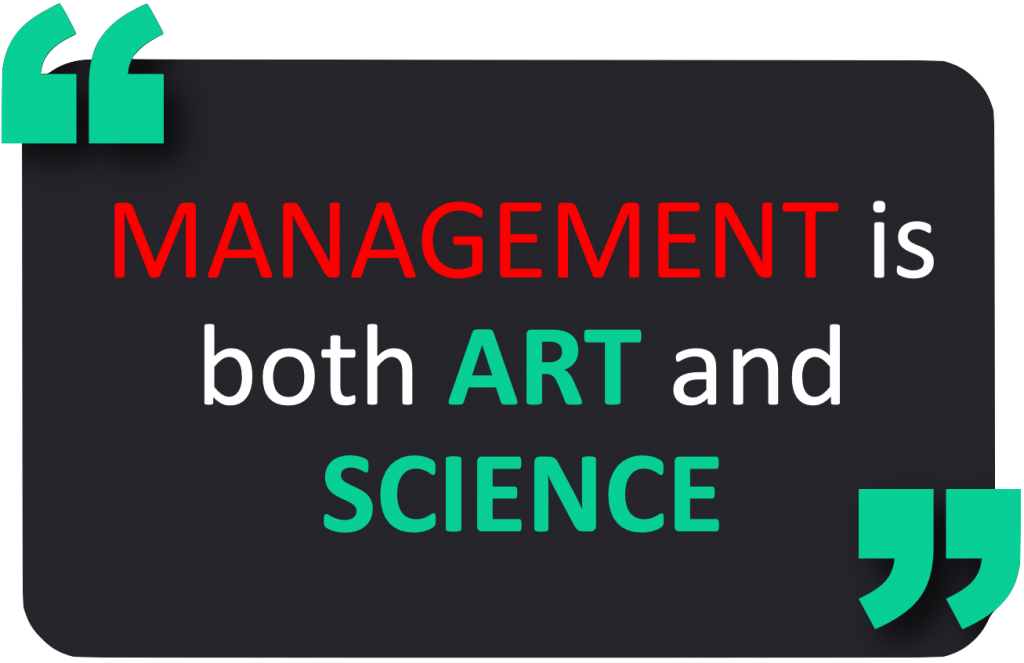Recently, I spoke to a group of new managers (mostly) and people who’ve transitioned from a Product/Program Management role about surprises that new people managers encounter. This talk was a drill down (albeit with a slight improvisation) on the research conducted by Michael E. Porter,Jay W. Lorsch, and Nitin Nohria which was outlined in their 2004 HBR article titled Seven Surprises for New CEOs . While the article dates back to 2004, the findings remain relevant even today.
While the original content was written with CEOs in mind, I’ve adapted that to managers at all levels given the audience of this networking session.

Management is both Art and Science. It is science because there’s systemic study material, repeatable processes, and causality that can be learnt. It’s an Art because management requires a considerable amount of skill, practice, creativity and Individual application – what works for one may not work for another person. It’s therefore imperative to understand what one can expect as they embark on their management journey and chart a course for success.
Let’s start with what new managers may find surprising as they embark on their management journey
You can’t do everything
As you enter management, you have to get comfortable with the feeling that you can’t be directly involved with everything that’s happening in your project / organization, yet you are fully accountable for outcomes & results. This is in stark contrast to back when you were an individual contributor and now your time will be needed in more places than you can imagine.
To avoid/overcome problems with this surprise, you have to learn to
- Effectively Delegate to your direct reports and trust them
- Manage your time efficiently
You can’t always tell people what to do
You cannot micromanage every decision by telling people how to do things. Like Steve jobs said “It doesn't make sense to hire smart people and then tell them what to to , We hire smart people so they can tell us what to do.” We should enable people by providing the right amount of clarity on the needs and expectations around outcomes/ results and provide autonomy to execute.
Practice the following and you’ll steer clear and learn more
- Provide Clarity
- Set Vision & Standards
- Define operating principles (review cadence, stakeholder communication, cost etc)
- Learn from mistakes (remember that we all learn from our mistakes, so create and embrace a culture where people can freely talk about failures and learnings from them)
- Avoid Decision Bottlenecks
- Share power and make people part of the decision making process. This can hugely improve trust.
- Encourage the culture of calculated risk taking.
- Learn and make use of Decision making tools.
You won’t always know what’s going on
As a manager, you’ll have a lot of things going on around you (meetings, stakeholder management, planning, people issues, budgeting, hiring, performance management and tons more). Amidst all of that, it’s very difficult to keep track of every aspect of what’s happening. People won’t immediately be willing to give you the bad news, so by the time it gets to you, it may be late or have some glossy touches added.
But to manage effectively, you need to stay on top of things and be in the loop. Here are some thoughts on what can help you get there.
- Identify ways to collect as much information as possible about what’s happening in the team from different sources.
- Practice Management by walking around (MBWA)
- Another alternate is Gemba walk, popularized by Toyota, where you walk to the place where the action happens, ask questions and learn.
- Have skip level 1:1s and team meetings.
- Build strong partnerships with all your stakeholders
- Talk to your peers, customers, cross functional leaders, HR partners etc. This will give you a rounded perspective of what’s happening.
You are always being watched!
I don’t’ say this as something to be scared about, but as a manager/leader of the organization, you are always sending a message. The way you speak (or don’t speak!), your body language, choice of words, way to write, everything starts to matter now. People will try to read between lines and there are chances you can be misinterpreted.
To avoid potential issues because of this, try to
- Lead by example. Role model the behavior you would like to see in your team members. Your actions will soon be replicated in your team, so use it to your advantage.
- Communicate clearly and ask for clarifications. Don’t assume people understood what you said.
- Improve your self-awareness and Emotional Quotient
- This is a continuous learning process, so you will have Blind spots. Get an accountability partner who can help provide feedback.
Organizational Politics is real!
Not all politics is bad. Organizational politics is real and how well you deal with it will also define your success trajectory. Studies show that individuals with political skills tend to have a greater impact on organizational outcomes. Understanding and navigating organizational politics and improving your influencing authority will provide better outcomes for your teams.

Here are some thoughts about how to handle this
- Be Politically Savvy. What this means is that you are aware of what’s going on around you, you’re paying attention to the dynamics, paying attention to who has power and influence, and what the culture of your organization is, and you are positioning yourself successfully with all that information.
- Build and leverage your network.
- Understand your stakeholders and map them. Power/interest grid for stakeholder prioritization on the left can be one useful technique.
You are still only Human!
You must remember that your position as a manager/leader does not automatically make you better or more capable. Like everyone else, you will learn from experience and the many mistakes that’ll provide important lessons along the way. However, as a manager, you have more accountability and responsibility, and how you role model your behaviors will be replicated.
It is essential to keep the following things in mind as you embark on your management/leadership journey.
- Your Work/Life balance is extremely important and how you manage it will be emulated by your team. Remember your mood will affect your team’s mood as well.
- A friend once gave me this priority list that I strive to follow – Health -> Family -> Relationships -> Work
- Being vulnerable and asking for help will improve trust with your teams and you’ll achieve more together.
- Be Thankful, stay humble and praise generously.
- Get a mentor/coach who can help you along the way and share their learnings.
Appendix
- Delegation is the assignment of authority to another person (normally from a manager to a subordinate) to carry out specific activities. It is the process of distributing and entrusting work to another person, and therefore one of the core concepts of management leadership. The process involves managers deciding which work they should do themselves and which work should be delegated to others for completion.[1] From a managerial standpoint, delegation involves shifting project responsibility to team members, giving them the opportunity to finalize the work product effectively, with minimal intervention. The opposite of effective delegation is micromanagement, where a manager provides too much input, direction, and review of delegated work. Delegation empowers a subordinate to make decisions. It is a shifting of decision-making authority as well as responsibility for the results from one organisational level to another lower one. However, a certain level of accountability for the outcome of the work does remain with the person who delegated the work to begin with.
- Time Management

